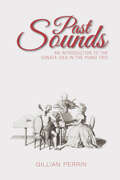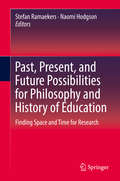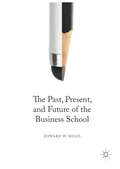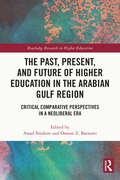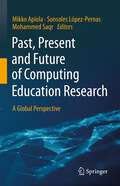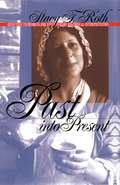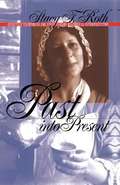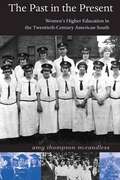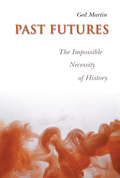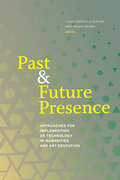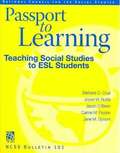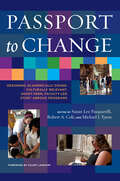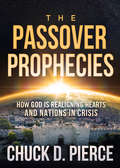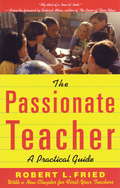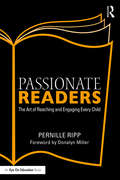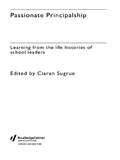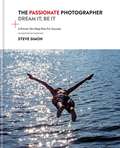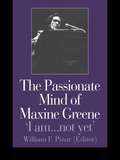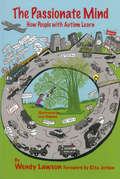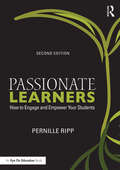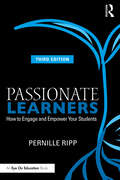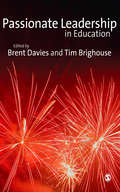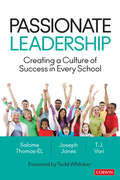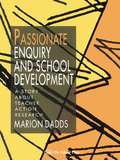- Table View
- List View
Past Sounds: An Introduction to the Sonata Idea in the Piano Trio
by Gillian PerrinThis is a book about classical music – for people who say they love music “but don’t understand how it works”, as well as for performers and music students of all ages. Proposing that deeper enjoyment begins with an understanding of music’s basic structures, the book describes how the simple template of earlier dance-songs was adapted by composers writing music for instruments. The instrumental sonata became one of the great formal frameworks of western music: in symphonies, concertos, chamber music and solo sonatas, it dominated concert music for some 250 years – yet it is little understood by many music lovers. To simplify this vast field, Past Sounds singles out for study “sonatas” for piano trio – piano, violin and ’cello. These instruments have well-contrasted and easily identifiable sounds, and as the story unfolds the reader is introduced to many rarely heard but beautiful works for piano trio. This is a lively, clearly-written narrative as well as a handbook for subsequent listening. The book has two distinctive features. Firstly, technical terms are carefully explained, and for those not familiar with music notation, audio clips in an accompanying website reproduce the actual sound of the music described. Secondly, in a broad historical sweep from mid-18th to 20th centuries, the development of the sonata is followed in its context of contemporary arts and literature – demonstrating how the sonata idea of classical music well deserves to be understood and valued as a western cultural archetype alongside other great artistic and literary forms.
Past, Present, and Future Possibilities for Philosophy and History of Education: Finding Space And Time For Research
by Stefan Ramaekers Naomi HodgsonOn the occasion of the retirement of Paul Smeyers, this book considers the state and status of the philosophy and history of education today. Over the last 20 years, the conditions in which research takes place have changed considerably. They have done so in ways that are often less than favourable to disciplines such as history and philosophy of education, and the space and time for the practices that constitute these disciplines – of reading, of writing, of collegiality – is increasingly under pressure. During this time, the Research Community on the History and Philosophy of Educational Research has convened annually to bring its critical lenses to bear on these emergent conditions and to suggest ways that educational research might, or ought to, be done otherwise. As co-founder and co-convenor of the Research Community, this volume explores and recounts Paul Smeyers' development of Wittgensteinian scholarship and its legacy in education, his formative role in the development of philosophy of education as an international field, his many international collaborations, the “useless” educational-philosophical deepening of concepts, and the wider educational-philosophical import of this. This gives rise to consideration of the failure of these fields to halt the changes in the governance and status of the university that threatens them, and those practices that remain and that are emerging in academia that we wish to protect, to pass on to the next generation of researchers in these fields.
The Past, Present, and Future of the Business School
by Edward W. MilesThis book examines the criticism that modern business schools face and how these obstacles have evolved throughout history. Through historical, resource, and professional school contexts, it sheds light on the operating environment of the business school and the challenges endemic to various university-based professional schools, exploring the likelihood that potential interventions will result in success or failure. Business schools are often accused of inhibiting the practice of business by producing research that is irrelevant and does not address real concerns facing managers. This book investigates these accusations by outlining the historical values on which academic institutions are based, the resources and funding available today, and comparisons to other professional schools which undergo a similar level of scrutiny. This extensive coverage will help academics, administrators, faculty, and policy makers with the tools to understand better the ill-will towards business schools in today's university structure, and ultimately to deliver on the benefits they provide to stakeholders.
The Past, Present, and Future of Higher Education in the Arabian Gulf Region: Critical Comparative Perspectives in a Neoliberal Era (Routledge Research in Higher Education)
by Awad Ibrahim Osman Z. BarnawiThis edited volume contributes a novel understanding of the past, present, and future of higher education across the six countries which make up the Gulf Cooperation Council (GCC). Against the backdrop of intense political, ideological, and epistemological disruptions across the Arabian Gulf Region over the last two decades, this volume adopts critical comparative perspectives in order to chart the history, present day, and future realities of higher education in Saudi Arabia, the United Arab Emirates, Oman, Qatar, Bahrain, and Kuwait. By focusing on dynamics relating to neoliberalism, and using the notions of ‘tensionality’ and ‘locality’ to situate topics such as curricula, policies, practices, the volume engages with current discourses, controversies, and themes such as the internationalization and marketization of high education in these countries. In doing so, the book offers a theoretical framework to enable greater understanding of the contemporary functioning of higher education in the Arabian Gulf Region. This text will benefit scholars, academics, and students in the fields of higher education and international and comparative education more broadly. Those involved with educational policy and politics, and Middle Eastern studies in general will also benefit from this volume.
Past, Present and Future of Computing Education Research: A Global Perspective
by Mikko Apiola Sonsoles López-Pernas Mohammed SaqrThis book presents a collection of meta-studies, reviews, and scientometric analyses that together reveal a fresh picture about the past, present, and future of computing education research (CER) as a field of science. The book begins with three chapters that discuss and summarise meta-research about the foundations of CER, its disciplinary identity, and use of research methodologies and theories. Based on this, the book proceeds with several scientometric analyses, which explore authors and their collaboration networks, dissemination practices, international collaboration, and shifts in research focus over the years. Analyses of dissemination are deepened in two chapters that focus on some of the most influential publication venues of CER. The book also contains a series of country-, or region-level analyses, including chapters that focus on the evolution of CER in the Baltic Region, Finland, Australasia, Israel, and in the UK & Ireland. Two chapters present case studies of influential CER initiatives in Sweden and Namibia. This book also includes chapters that focus on CER conducted at school level, and cover crucially important issues such as technology ethics, algorithmic bias, and their implications for CER.In all, this book contributes to building an understanding of the past, present and future of CER. This book also contributes new practical guidelines, highlights topical areas of research, shows who to connect with, where to publish, and gives ideas of innovative research niches. The book takes a unique methodological approach by presenting a combination of meta-studies, scientometric analyses of publication metadata, and large-scale studies about the evolution of CER in different geographical regions. This book is intended for educational practitioners, researchers, students, and anyone interested in CER. This book was written in collaboration with some of the leading experts of the field.
Past into Present
by Stacy F. RothFirst-person interpretation--the portrayal of historicalcharacters through interactive dramatization or roleplaying--isan effective, albeit controversial, method used to bring historyto life at museums, historic sites, and other public venues.Stacy Roth examines the techniques of first-person interpretationto identify those that have been most effective with audienceswhile allowing interpreters to maintain historical fidelity. Past into Present focuses on first-personinterpretation's most challenging form: the unscripted,spontaneous, conversational approach employed in "living history"environments such as Plimoth Plantation in Massachusetts, ConnerPrairie in Indiana, and Colonial Williamsburg in Virginia. Whileacknowledging that a wide range of methods can touch audienceseffectively, Roth identifies a core set of practices that combinepositive communication techniques, classic interpretivephilosophy, and time-tested learning theories to promote audienceenjoyment, provoke thought and inquiry, convey important messagesand themes, and relate to individual visitor interests. Sheoffers numerous examples of conversation and demonstrationstrategies, visitor behavior profiles, and suggestions fordepicting conflict and controversy, and she provides usefulcharacter development guidelines, interpretive training advice, and recommendations for adapting first-person interpretation fordiverse audiences.
Past into Present: Effective Techniques for First-Person Historical Interpretation
by Stacy F. RothThe portrayal of historical characters through interactive dramatization or role-playing is an effective, albeit controversial, method used to bring history to life at museums, historic sites, and other public venues. Stacy Roth examines the techniques of first-person interpretation to identify those that have been most effective with audiences while allowing interpreters to maintain historical fidelity.
The Past in the Present: Women's Higher Education in the Twentieth-century American South
by Amy T. McCandlessThe history of higher education in the 20th-century South, like the history of the region, both mirrors and diverges from the national pattern. Not surprisingly the region’s demographic, economic, social, political, and cultural characteristics have accounted for many of the variations between the education of southern women and women in the rest of the nation.
Past Futures
by Ged MartinBy nature, human beings seek to make sense of their past. Paradoxically, true historical explanation is ultimately impossible. Historians never have complete evidence from the past, nor is their methodology rigorous enough to prove causal links. Although it cannot be proven that 'A caused B,' by redefining the agenda of historical discourse, scholars can locate events in time and place history once again at the heart of intellectual activity.In Past Futures, Ged Martin advocates examining the decisions that people take, most of which are not the result of a 'process,' but are reached intuitively. Subsequent rationalizations that constitute historical evidence simply mislead. All historians can do is to locate them in time, to explain not why a decision was taken, but why then? To illustrate, Martin asks a number of questions: What is a 'long time' in history? Are we close to the past or remote from it? Is democracy a recent experiment, or proof of our arrival at the end of a journey through time? Can we engage in a historical dialogue with the past without making clear our own ethical standpoints? Although explanation is ultimately impossible, humankind can make sense of its location in time through the concept of 'significance,' a device for highlighting events and aspects of the past. In so doing, Martin suggests a radical new approach to historical discourse.
Past and Future Presence: Approaches for Implementing XR Technology in Humanities and Art Education
by Lissa Crofton-Sleigh Brian BeamsWhile uses and studies of XR technology within STEM-based education have been plentiful in recent years, there has been lesser or even, at times, a lack of coverage for this novel learning tool in the arts and humanities.Past and Future Presence aims to bridge some of that gap by presenting research-based theory and case studies of successful application and implementation of XR technology into postsecondary educational settings, ranging in topics from ancient to modern languages, classical and contemporary art, and reenvisioned historical scenes and events presented in ways never seen before. The studies also contemplate how this novel medium can enhance and supplement learning in classrooms and other formal or informal learning environments. The volume as a whole is intended to demonstrate to educators, scholars, and researchers in higher education the potential value of integrating XR technology into their classrooms and to provide a strong argument for college and university administrators to invest in training and development of new research and content for classrooms inside and outside of STEM. The authors of these chapters come from a diverse range of backgrounds at different stages of their careers, providing a broad crosssection of scholastic work within the humanities and arts. Each chapter offers a different angle or approach to incorporating XR technology into teaching or research within different subject areas. As the volume suggests, this technology also places additional emphasis on the humanity within the humanities, by focusing on increasing connection between users and different cultures, time periods, and perspectives.
Passport to Learning: Teaching Social Studies
by Barbara C. Cruz Joyce W. Nutta Jason O'BrienPassport to Learning: Teaching Social Studies
Passport to Change: Designing Academically Sound, Culturally Relevant, Short-Term, Faculty-Led Study Abroad Programs
by Hilary Landorf Susan Lee Pasquarelli Robert A. Cole Michael J. TysonThere has been enormous growth in faculty-led short-term study abroad programs because they offer flexibility and expand opportunities for students and faculty members who wish to study and work abroad but do not have the resources or time to spend a semester or year away. These experiential programs offer unique opportunities for university faculty to teach their disciplines abroad while engaging students in direct, authentic cultural encounters for transformative change.This volume provides a detailed framework and guidance on how to plan and implement a faculty-led study abroad program. Seasoned faculty leaders and administrators describe an overall program development process, comprehensively identify the elements for designing the curriculum, and offer advice and solutions to unique challenges inherent in various types of programs. The contributors cover the logistics for managing program details at home and abroad provide advice on writing a university proposal, creating a budget, the marketing and recruitment of students, handling abroad logistics, and preparing students for the abroad experience – all illustrated by examples drawn from their experiences. Most importantly, readers will come to understand the difference between experiences that are more touristic than scholarly and gain guidance on designing or redesigning their own programs to ensure academically sound, culturally-relevant curricula that complements the international field site.The opening section sets the scene by describing the overall process of designing and delivering faculty-led abroad programs, from conception to implementation. The core of the book is grounded in evidence-based research for designing international curricula and syllabi, and includes five case studies illustrating short term programs focused on interdisciplinary subject matter, field study, global service learning, internship immersion, and language and cultural study. This practical guide concludes with faculty activities critical to a program’s success: marketing and recruiting students; preparing teaching events for before, during, and after the abroad experience; and formulating a plan to leave a small footprint abroad. This book constitutes a handbook for college and university professors who plan to or already conduct short-term study abroad programs as well as administrators and staff of global and international programs.ContributorsBilge Gokhan CelikRobert A. Cole Darla K. DeardorffCandelas Gala Javier Garcia GarridoDale LeavittRoxanne O’ConnellSusan Lee PasquarelliMichele V. PriceAutumn Quezada de Tavarez Victor Savicki Michael ScullyMichael TysonKerri Staroscik WarrenPaul Webb Brian WysorMin Zhou
The Passover Prophecies: How God is Realigning Hearts and Nations in Crisis
by Dr. Chuck PierceGod is realigning hearts and nations in crisis. This book will allow you to hear what the Spirit is saying to the churches in this season of a modern-day Passover. A timely prophetic message on how to discern the times and know what to do as the body of Christ. As people and nations emerge in the aftermath of this pandemic, God will realign hearts and nations in preparation for an end-time harvest. BRIEF SUMMARY: One of America&’s most-respected prophetic voices brings a critical message to a nation—and world—at a crossroads. In September 2019, God revealed to Chuck Pierce that between February and April 2020, plague-like conditions would hit the earth. The Lord said, &“I will be waiting to see which nations &‘pass over.&’&” Just like the very first Passover, God is looking for a remnant that will hold strong and bring His love to a hurting planet. Pierce divides the rumors from the Word, and answers such questions as: Why would the current situation be happening around the time of Passover 2020?Is this a modern-day plague for a modern-day Passover?Are nations still trying to bring other nations under their control and economic rule?What is Israel&’s role in this critical time?How do we move forward today? In the midst of pandemic, God is also assuring His Church that after this period, for those who hold fast to Jesus, there will be a time of celebration. In The Passover Prophecies, Pierce delves into the ancient biblical signs that point toward a glorious future for the people of God. Move forward, feed your faith, and know that even in the midst of uncertainty, His kingdom shall overcome, and His will shall be done on Earth as it is in Heaven.
The Passionate Teacher
by Robert FriedAn inspiring handbook, enthusiastically embraced by teachers; with a new chapter Every teacher can be a passionate teacher-one who engages young people in the excitement of learning and ideas-if teaching is not undermined by the ways we "do business" in schools. The Passionate Teacher draws on voices, stories, and successes of teachers in urban, suburban, and rural classrooms to help you become, and remain, a passionate teacher despite the obstacles. This edition includes a new chapter for teachers beginning their careersFrom the Trade Paperback edition.
Passionate Readers: The Art of Reaching and Engaging Every Child
by Pernille RippHow do we inspire students to love reading and discovery? In Passionate Readers: The Art of Reaching and Engaging Every Child, classroom teacher, author, and speaker Pernille Ripp reveals the five keys to creating a passionate reading environment. You’ll learn how to… Use your own reading identity to create powerful reading experiences for all students Empower your students and their reading experience by focusing on your physical classroom environment Create and maintain an enticing, well-organized, easy-to-use classroom library; Build a learning community filled with choice and student ownership; and Guide students to further develop their own reading identity to cement them as life-long, invested readers. Throughout the book, Pernille opens up about her own trials and errors as a teacher and what she’s learned along the way. She also shares a wide variety of practical tools that you can use in your own classroom, including a reader profile sheet, conferring sheet, classroom library letter to parents, and much more. These tools are available in the book and as eResources to help you build your own classroom of passionate readers.
Passionate Principalship: Learning from the Life Histories of School Leaders
by Ciaran SugrueThis book puts 'real life' back into the literature on school principalship. Through a life history approach, it portrays daily life in schools as a much more messy, contested and precarious existence, where principals struggle with passionate commitment to find continuity amongst frequently changing and often conflicting policy initiatives.The book draws on comprehensively in-depth interview data with new, experienced and veteran principals. Their life stories illustrate the struggles involved in the ongoing negotiation of identities through unprecedented change. The authors lucidly argue that:* The realities of principals' lives are much more demanding that rational linear approaches to reform suggest;* A revolving door approach to the appointment of principals is inadequate* Passion is central to the lives and work of principals, but this passion needs to be rejuvenated and rekindled through opportunities for learning* There is a need for further research on the relationship between the lifecycles of principals, the leadership legacies of school communities and the cycles of mandated reforms as a means of lending coherence to leadership learning and sustained and renewed leaders.This is essential reading for principals and their professional bodies, academics and researchers, school leaders on leadership courses internationally.
The Passionate Photographer 2nd Ed: Ten Steps Towards Becoming Great: the Remastered Edition of the Bestselling Classic Work for All Photographers
by Steve SimonTake your passion for photography and close the gap between what you hope to achieve and what you do, following one of the world's most highly regarded photographers. This book will help you think about your photography and find a visual voice. It follows a clear structure which will make it useful for any reader, and is fully illustrated with Simon's own inspiring photography and some work from the historical greats. Simon's understanding of photography makes for a book filled with tips you can immediately fold into your own shooting, quickly establishing your own vision, learning what to concentrate on in a shot, and pushing you beyond your comfort zone. It also includes "lessons learned" from Steve's experience, so you can neatly side-step some problems even the pros have had to endure.
The Passionate Mind of Maxine Greene: 'I am ... not yet'
by William F. PinarMaxine Greene is the most important philosopher of education in the United States today. The author of Teacher as Stranger (1973), Landscapes of Learning (1978), Dialectic of Freedom (1988), and Releasing the Imagination (1995), Greene has influenced tens of thousands of teachers in North America as well as her colleagues in philosophy of education, teacher education, and curriculum studies. While widely cited, Greene has not - until now - been the subject of sustained scholarly analysis and investigation. William F. Pinar has organized a systematic study of Greene's contribution from several points of view: studies of the four books; studies of the intellectual and aesthetic influences upon her theory; and her influence on the various specializations within the broad field of education: the teaching of English, arts education, philosophy of education, curriculum studies, religious education, cognitive theory, and theory of teaching. The book opens and concludes with Maxine Greene's own autobiographical statements.
The Passionate Mind
by Wendy LawsonIn her new book, Wendy Lawson examines traditional theories about the autism spectrum (AS) and reveals their gaps and shortcomings. Showing that a completely different way of thinking about AS is needed, she sets forward the theory of Single Attention and Associated Cognition in Autism (SAACA), an approach that explains autism in terms of the unique learning style of AS individuals. The SAACA approach suggests that whereas neurotypical people can easily shift their attention from one task to another, those on the autism spectrum tend to use just one sense at a time, leading to a deep, intense attention. From the perspective of this new approach, Wendy describes practical outcomes for individuals, families, and places of education and employment, and shows that when the unique learning style of AS is understood, valued, and accommodated, AS individuals can be empowered to achieve their fullest potential. This is a fascinating read for anyone with a personal or professional interest in the autism spectrum, including clinical practitioners, educators, researchers, individuals on the spectrum and their families, teachers, occupational therapists, and other professionals.
Passionate Learners: How to Engage and Empower Your Students
by Pernille RippWould you want to be a student in your own classroom? In Passionate Learners: How to Engage and Empower Your Students, author Pernille Ripp challenges both novice and seasoned teachers to create a positive, interactive learning environment where students drive their own academic achievement. You’ll discover how to make fundamental changes to your classroom so learning becomes an exciting challenge rather than a frustrating ordeal. Based on the author’s personal experience of transforming her approach to teaching, this book outlines how to: • Build a working relationship with your students based on mutual trust, respect, and appreciation. • Be attentive to your students’ needs and share ownership of the classroom with them. • Break out of the vicious cycle of punishment and reward to control student behaviour. • Use innovative and creative lesson plans to get your students to become more engaged and intellectually-invested learners, while still meeting your state standards. • Limit homework and abandon traditional grading so that your students can make the most of their learning experiences without unnecessary stress. • And much more! New to the second edition, you’ll find practical tools, such as teacher and student reflection sheets, parent questionnaires, and parent conference tools--available in the book and as eResources on our website (http://www.routledge.com/9781138916920)—to help you build your own classroom of passionate learners.
Passionate Learners: How to Engage and Empower Your Students
by Pernille RippWould you want to be a student in your own classroom? In this bestselling book, Pernille Ripp invites both novice and seasoned teachers to co-create a positive, interactive learning environment with students. Based on honest reflections on her own teaching experience, Pernille offers a wide variety of ideas for sharing control, developing your intuition, learning how to fail, giving yourself grace, building community and trust, creating more choice, allowing time for student expertise, and letting go of the punish, behave, and reward cycle so that intrinsic motivation can thrive. This fully enhanced new edition is chock full of additional strategies and tools on topics such as centering students’ identities, overcoming barriers when creating student-centered lessons to emphasize ownership of the learning cycle, shoring up your boundaries to manage your time and stop the intense prep work, changing your homework habits to reduce your load and give students more time, deemphasizing grades, and much more. With Pernille’s heartfelt stories and practical strategies, you’ll feel inspired to give your classroom back to your students and foster a community of truly passionate learners!
Passionate Leadership in Education
by Brent Davies Tim Brighouse'I recommend the book as an inspiration to those who are looking for the words that express what they may already do (or will do in the future!) for these well known writers have world wide experience in recognising and knowing what it is that makes the passionate leader' - International Journal of Educational Management 'This is a very interesting collection of chapters on leadership...Each chapter is written with verve and conviction, and it makes quite stimulating reading' - Curriculum Perspectives 'Passionate Leadership is a fantastic book by leading thinkers and doers in the education field. It takes moral purpose to new levels, and above all it puts passion in perspective. The book shows that it is not passion by itself that counts but in combination with strategies, insights and daily wisdom. Above all this is a book of action , not rhetoric.' - Michael Fullan, Professor Emeritus, OISE/University of Toronto and Special Adviser on Education to the Premier of Ontario 'How opportune that Brent Davies and Tim Brighouse have produced a book on "Passionate Leadership". As school leaders are becoming increasingly disillusioned with instrumental forms of educational reform, Davies, Brighouse and their contributors offer a new vision of leadership one that is driven by a belief that teaching is about enabling every child to reach their potential, and a conviction that schools should be places filled with joy and optimism in the pursuit of social justice. This inspiration will encourage all our leaders to take their work to a new level.' - Professor David Hopkins, HSBC iNet Chair of International Leadership, Formerly the Chief Adviser to three Secretary of States In this book, internationally recognized writers on leadership explore what makes leaders passionate about their role and their schools. The contributors show that leadership must move on from the realm of a role or job towards an energy and commitment for enhancing children's learning and children's lives. They maintain that passion must be the driving force that moves vision into action, through a range of chapters from internationally known contributors Brent Davies, Tim Brighouse, Geoff Southworth, Chris Day, John MacBeath, Andy Hargreaves, John Novak, Brain Caldwell, and Alan Flintham. What sustains and drives leaders to achieve in a changing and challenging educational environment? What maintains their passion for education and children's achievement? This book seeks to answer these questions. The book is essential for all students on leadership programs and educational professionals looking to achieve self and organisational improvement.
Passionate Leadership: Creating a Culture of Success in Every School
by Joseph Jones T.J. Vari Dr. Salome Thomas-ELReignite your passion for serving children! This is an inspiring call to action for teachers and principals around the world to recommit to passionately serving children, building the communities children deserve, and celebrating our successes. The authors of this book examine what it takes to be a passionate leader and take courageous actions which lead to student growth and success. Educators ready to push to new heights and break boundaries will find: Practical ideas and suggestions for how to serve as a beacon of hope in the field First-hand experiences from enthusiastic leaders modeling what passionate leadership looks like Charts and graphs that will help you assess your strong points and identify areas you can improve on
Passionate Leadership: Creating a Culture of Success in Every School
by Joseph Jones T.J. Vari Dr. Salome Thomas-ELReignite your passion for serving children! This is an inspiring call to action for teachers and principals around the world to recommit to passionately serving children, building the communities children deserve, and celebrating our successes. The authors of this book examine what it takes to be a passionate leader and take courageous actions which lead to student growth and success. Educators ready to push to new heights and break boundaries will find: Practical ideas and suggestions for how to serve as a beacon of hope in the field First-hand experiences from enthusiastic leaders modeling what passionate leadership looks like Charts and graphs that will help you assess your strong points and identify areas you can improve on
Passionate Enquiry & School: A Story About Teacher Action Research
by Marion DaddsFirst published in 1995. Routledge is an imprint of Taylor & Francis, an informa company.
